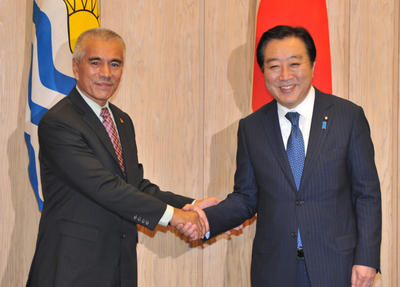The most likely explanation for such attention, it was argued, was that the United States was reacting to China’s growing influence and refocusing on the region as part of its ‘pivot’ to the Asia Pacific.
In a similar vein, visits to the region by high-level representatives of other major powers — including the Foreign Minister of Russia and China’s second-ranked political leader at the time — were seen as a product of those countries’ new and evolving agendas. The Pacific islands seemed spoiled for choice as a range of new actors made diplomatic overtures.
Pacific leaders generally welcomed this attention — as the Kiribati President wryly remarked: ‘It’s nice to be relevant’. But they could also claim at least partial credit for orchestrating the newfound political relevance of the Pacific. Regional leaders increasingly recognise the need for island states to become more independent and assertive in their foreign policy. It is particularly important for Pacific voices to be heard in the areas of sustainable development, ocean governance and climate change.
In fact, while Pacific leadership is often overlooked in regional analyses, it accounts for much of the energy and dynamism present in Pacific regional diplomacy.
At the international level, Pacific Small Islands Developing States (PSIDS) — an informal group of 11 states at the UN — continued to raise their profile in 2012. Russia held a ministerial meeting with PSIDS on the sidelines of the UN General Assembly. Fiji was co-Chair of the General Assembly while Nauru chaired the 43-member Alliance of Small Islands States. Samoa was named as the host of the next Global Small Island Developing States Conference in 2014, while Fiji scored a major diplomatic feat when it was elected Chair of the 132-member G77 plus China in 2013.
This achievement was particularly significant in the context of Fiji’s increasingly proactive foreign policy under Prime Minister Voreqe Bainimarama. Fiji’s government now talks of ‘enhancing global integration and international relations’, moving Fiji away from being ‘overly reliant on traditional partners’ and pursuing an ‘open door’ policy of engaging with ‘all members of the international community’.
Fiji has now established formal diplomatic ties with more than 120 countries and since 2010 has established five new embassies (including in Seoul and Abu Dhabi in 2012). It joined the Non-Aligned Movement (NAM) in 2011, which paved the way for closer ties with North Korea. At the 2012 NAM meeting in Tehran, a Memorandum of Understanding between North Korea and Fiji was signed and Fiji subsequently became the first Pacific island state to accredit an ambassador to Pyongyang.
Fiji was also active at the regional level. It moved to institutionalise the annual Engaging with the Pacific process, a series of meetings with Pacific states that Fiji set up after it was excluded from the Pacific Islands Forum in 2009. From 2013, this meeting will become a new regional group — the Pacific Islands Development Forum. Its primary purpose will be to provide a regional counterpoint to the PSIDS group at the UN — an initiative that explicitly challenges the established role of the Pacific Islands Forum Secretariat.
A review of the Forum Secretariat made clear there was widespread disaffection with the Pacific Islands Forum. Fiji’s ongoing exclusion from the Pacific ACP (African, Caribbean and Pacific) leaders’ meetings was also a problem. Fiji had been excluded because the Pacific Islands Forum Secretariat managed the meetings, but Pacific leaders found a way to resolve this issue when they agreed in Port Moresby to create a new managing body. PNG will now host and fund a new Pacific ACP Secretariat. PNG’s role in resolving this issue underscored the growing ties between it and Fiji, the region’s two major economies. While closer economic relations have been long anticipated they are only now beginning to bear fruit in the form of increased trade, investment and movement of skilled workers.
Regionalism is taking on new forms in the Pacific — something that the forthcoming review of the Pacific Plan needs to acknowledge. New forms of intra-regional cooperation based on cultural, economic and political partnerships and groupings are a big part of the transformation. But also important is the reassertion of a regionalism that seeks to position the Pacific island states more favourably in the evolving international order and that will create new opportunities for economic growth and development.
Sandra Tarte is Associate Professor and Director of the Politics and International Affairs Program at the University of the South Pacific in Suva, Fiji.
This is part of a special feature on 2012 in review and the year ahead.

